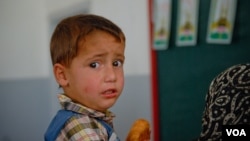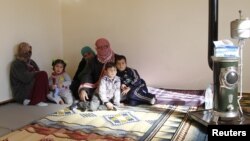ARSAL, LEBANON —
As refugees continue streaming out of Syria to escape the violence of the civil war, tens of thousands of them are taking shelter in Lebanon, many in towns like this one near the frontier in the Bekaa Valley.
On a recent day, lines of laundry are draped across the school playground and aid workers mingle with children and their parents in the hallways of nearby buildings. The main topic of conversation for most is where their next meal is coming from and where they might be living in the coming weeks.
Source: UNHCR
The latest United Nations figures estimate the overall number of Syrian refugees at more than 250,000, and of those, more than 70,000 are believed to be living in Lebanon. The number here is uncertain because many are afraid to register with official agencies out of fear of retribution due to the close ties between the governments in Damascus and Beirut.
Syrians seeking refuge in Lebanon face a number of challenges. Almost weekly, Syrian troops make brief cross-border incursions into Lebanon. Syrian Army units frequently shell Lebanese territory, killing dozens, mainly Lebanese civilians but Syrian refugees as well. This town, just under 10 kilometers from the Syrian frontier, has even seen Syrian air force attacks nearby.
Despite the pressure from Syria, the refugees have been getting along well - so far - with their new Lebanese neighbors. Some families in Arsal have even opened their homes to refugees.
The latest arrivals, however, are putting a strain on local resources. The cost of living has soared in recent months and that could lead to friction.
Lebanon has a troubled history with refugees. Its long and traumatic civil war was in part brought on by Palestinian militants using Lebanon as a base for attacks against Israel and rival Lebanese militias. Many Lebanese fear renewed violence as the civil war in Syria has already played out in bloody outbursts in Lebanese cities and border areas this year.
Refugees strain resources
The head of the Arsal municipality, Ali al-Hujairi, says his town cannot handle many more arrivals and that the ones already living here have strained its limited resources. Al-Hujairi also concedes that Free Syrian Army rebel fighters are taking shelter in the town.
"I cannot hide the fact that [the refugees] support the revolution,” he said. “Some of them go to fight, too. All of Arsal supports the revolution."
The Lebanese government had previously helped with medical care for Syrians through the High Relief Commission, run through the office of Prime Minister Najib Mikati. But in August, it announced that state funds had run out. The Cabinet is still debating a new budget, meaning an influx of new funds will be delayed further, if approved at all.
A worker from the international aid group, Médecins Sans Frontières, described the emotional state of the refugees as "desperate," saying roughly 30 percent of the displaced Syrians here suffer from anxiety, depression and psychosomatic disorders.
"The majority of the time, from what we are seeing, they don't feel secure after fleeing Syria," said the aid worker, who asked not to be named.
About 85 percent of secondary health care in the Bekaa region is being covered by the Qatari Red Crescent, according to figures provided by the Beirut office of the United Nations High Commissioner for Refugees.
Recently, Médecins Sans Frontières workers were busy vaccinating children in one of the Arsal schools serving as a temporary home for displaced Syrians. A young boy named Mohammed cried as he waited with his mother for a vaccination at the school in Arsal: "He used to be named Bashar," after President Bashar al-Assad of Syria, his mother said with a wide grin.
A father living with his wife and five young children in an unfinished home in Arsal said he had not been able to work since arriving several months ago. His story is not unusual.
The little money that most refugees carried out with them is completely gone or running out. Assistance from aid groups and local residents is limited.
As one example, a Médecins Sans Frontières report issued last month said, "Those living in the Bekaa Valley appear to have twice as much access to drinking water [as in other areas], meaning it is likely they purchase it, adding burden to already limited finances."
Living conditions stressful
Some displaced families set up tent camps in the yards of sympathetic Lebanese. Others moved into unfinished buildings and construction sites. But the living conditions in many locations are dire, and with the onset of cooler weather fast approaching, open-air shelters in this town at the foot of the Anti-Lebanon mountain range will offer little protection from the elements.
For now, the people of Arsal are doing what they can. The municipality chief, al-Hujairi, warns of a desperate situation that is bound to get worse. He notes that the surrounding villages are primarily Shiite Muslim and support the Assad regime, making it nearly impossible for refugees to leave town. When they do, they are frequently attacked.
"They [the refugees] have not stopped coming across, and we receive no help from the Lebanese government," al-Hujairi said. "Of course we will help all of them, but how many more can we take?"
On a recent day, lines of laundry are draped across the school playground and aid workers mingle with children and their parents in the hallways of nearby buildings. The main topic of conversation for most is where their next meal is coming from and where they might be living in the coming weeks.
Syrian Refugees by Country
Numbers of Syrian Refugees, by Country- Turkey: 138,401
- Lebanon: 133,634
- Jordan: 123,747
- Iraq: 60,307
Source: UNHCR
Syrians seeking refuge in Lebanon face a number of challenges. Almost weekly, Syrian troops make brief cross-border incursions into Lebanon. Syrian Army units frequently shell Lebanese territory, killing dozens, mainly Lebanese civilians but Syrian refugees as well. This town, just under 10 kilometers from the Syrian frontier, has even seen Syrian air force attacks nearby.
Despite the pressure from Syria, the refugees have been getting along well - so far - with their new Lebanese neighbors. Some families in Arsal have even opened their homes to refugees.
The latest arrivals, however, are putting a strain on local resources. The cost of living has soared in recent months and that could lead to friction.
Lebanon has a troubled history with refugees. Its long and traumatic civil war was in part brought on by Palestinian militants using Lebanon as a base for attacks against Israel and rival Lebanese militias. Many Lebanese fear renewed violence as the civil war in Syria has already played out in bloody outbursts in Lebanese cities and border areas this year.
Refugees strain resources
The head of the Arsal municipality, Ali al-Hujairi, says his town cannot handle many more arrivals and that the ones already living here have strained its limited resources. Al-Hujairi also concedes that Free Syrian Army rebel fighters are taking shelter in the town.
"I cannot hide the fact that [the refugees] support the revolution,” he said. “Some of them go to fight, too. All of Arsal supports the revolution."
The Lebanese government had previously helped with medical care for Syrians through the High Relief Commission, run through the office of Prime Minister Najib Mikati. But in August, it announced that state funds had run out. The Cabinet is still debating a new budget, meaning an influx of new funds will be delayed further, if approved at all.
A worker from the international aid group, Médecins Sans Frontières, described the emotional state of the refugees as "desperate," saying roughly 30 percent of the displaced Syrians here suffer from anxiety, depression and psychosomatic disorders.
"The majority of the time, from what we are seeing, they don't feel secure after fleeing Syria," said the aid worker, who asked not to be named.
About 85 percent of secondary health care in the Bekaa region is being covered by the Qatari Red Crescent, according to figures provided by the Beirut office of the United Nations High Commissioner for Refugees.
Recently, Médecins Sans Frontières workers were busy vaccinating children in one of the Arsal schools serving as a temporary home for displaced Syrians. A young boy named Mohammed cried as he waited with his mother for a vaccination at the school in Arsal: "He used to be named Bashar," after President Bashar al-Assad of Syria, his mother said with a wide grin.
A father living with his wife and five young children in an unfinished home in Arsal said he had not been able to work since arriving several months ago. His story is not unusual.
The little money that most refugees carried out with them is completely gone or running out. Assistance from aid groups and local residents is limited.
As one example, a Médecins Sans Frontières report issued last month said, "Those living in the Bekaa Valley appear to have twice as much access to drinking water [as in other areas], meaning it is likely they purchase it, adding burden to already limited finances."
Living conditions stressful
Some displaced families set up tent camps in the yards of sympathetic Lebanese. Others moved into unfinished buildings and construction sites. But the living conditions in many locations are dire, and with the onset of cooler weather fast approaching, open-air shelters in this town at the foot of the Anti-Lebanon mountain range will offer little protection from the elements.
For now, the people of Arsal are doing what they can. The municipality chief, al-Hujairi, warns of a desperate situation that is bound to get worse. He notes that the surrounding villages are primarily Shiite Muslim and support the Assad regime, making it nearly impossible for refugees to leave town. When they do, they are frequently attacked.
"They [the refugees] have not stopped coming across, and we receive no help from the Lebanese government," al-Hujairi said. "Of course we will help all of them, but how many more can we take?"





